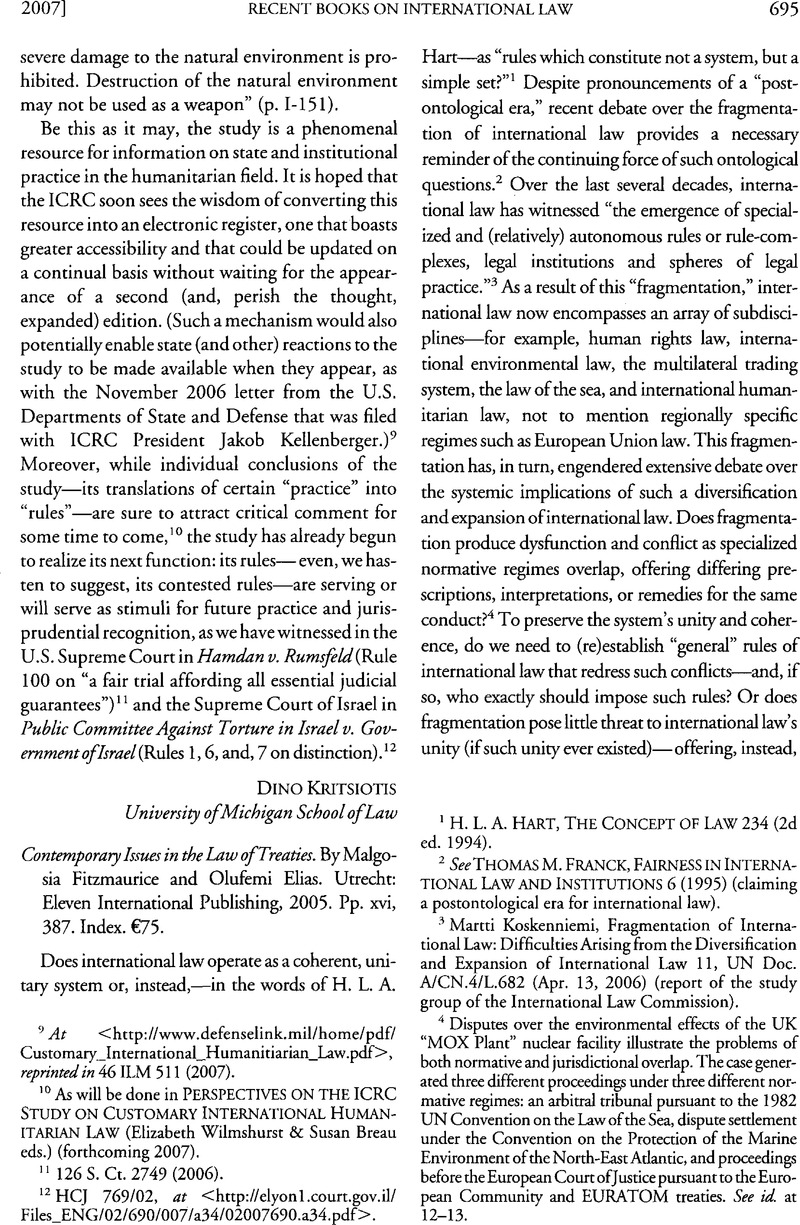No CrossRef data available.
Article contents
Contemporary Issues in the Law of Treaties. By Malgosia Fitzmaurice and Olufemi Elias. Utrecht: Eleven International Publishing, 2005. Pp. xvi, 387. Index. €75.
Published online by Cambridge University Press: 27 February 2017
Abstract

- Type
- Recent Books on International Law
- Information
- Copyright
- Copyright © American Society of International Law 2007
References
1 H.L.A. Hart, The Concept of Law 234 (2d ed. 1994).
2 See Thomas, M. Franck, Fairness In International Law and Institutions 6 (1995)Google Scholar (claiming a postontological era for international law).
3 Martti, Koskenniemi, Fragmentation of International Law: Difficulties Arising from the Diversification and Expansion of International Law 11, UN Doc. A/CN.4/L.682 (Apr. 13, 2006)Google Scholar (report of the study group of the International Law Commission).
4 Disputes over the environmental effects of the UK “MOX Plant” nuclear facility illustrate the problems of both normative and jurisdictional overlap. The case generated three different proceedings under three different normative regimes: an arbitral tribunal pursuant to the 1982 UN Convention on the Law of the Sea, dispute settlement under the Convention on the Protection of the Marine Environment of the North–East Atlantic, and proceedings before the European Court of justice pursuant to the European Community and Euratom treaties. See id. at 12–13.
5 For views critical of fragmentation’s effects or proposing remedial measures, see Joost, Pauwelyn, Conflict of Norms in Public International Law: How the Wto Law Relates to Other Rules of International Law (2003)Google Scholar; Christopher, J. Borgen, Resolving Treaty Conflicts, 37 Geo. Wash. Int’l L. Rev. 573 (2005)Google Scholar; Gilbert, Guillaume, President, International Court of justice, Address at the Lauterpacht Research Centre for International Law, University of Cambridge (Nov. 9, 2001), at <http://www.lcil.cam.ac.uk/Media/lectures/doc/Guillaume.doc=Google Scholar; see also C. Wilfred, Jenks, The Conflict of Law– Making Treaties, 1953 Brit. Y.B. Int’l L. 401.Google Scholar For more accommodating views of fragmentation, see Joel, Trachtman, Conflict of Norms in Public International Law: How WTO Law Relates to Other Rules of International Law, Book Review, 98 AJIL 855 (2004)Google Scholar; Charney, J. I., International Law and Multiple International Tribunals, 271 Recueil Des Cours 101, 352–56 (2002)Google Scholar; Martti, Koskenniemi & Päivi, Leino, Fragmentation of International Law? Postmodern Anxieties, 15 Leiden J. Int’l L. 553 (2002).Google Scholar
6 Mcnair, A., The Law of Treaties (1961)Google Scholar; Ian, Sinclair, Vienna Convention On The Law of Treaties (2d ed. 1984)Google Scholar; Paul, Reuter, Introduction Au Droit Des Traites (2d ed. 1985)Google Scholar; Anthony, Aust, Modern Treaty Law and Practice (2000).Google Scholar
7 See, e.g., Jan, Klabbers, The Concept of Treaty In International Law (1996)Google Scholar; Shabtai, Rosenne, Breach of Treaty (1985)Google Scholar.
8 For an earlier example see Shabtai, Rosenne, Developments In The Law of Treaties 1945–1986 (1989).Google Scholar
9 See Hart, supra note 1, at 91–99.
10 Fragmentation of International Law: Difficulties Arising from the Diversification and Expansion of International Law: Report of the Study Group of the International Law Commission 6, UN Doc. A/CN.4/L.702 (July 18, 2006).
11 Land and Maritime Boundary Between Cameroon and Nigeria (Cameroon v. Nig.; Eq. Guinea Intervening), 2002 IJC Rep. 1 (Oct. 10). Article 46(1) of the VCLT provides that a “State may not invoke the fact that its consent to be bound by a treaty has been expressed in violation of a provision of its internal law regarding competence to conclude treaties as invalidating its consent unless that violation was manifest and concerned a rule of its internal law of fundamental importance.”




